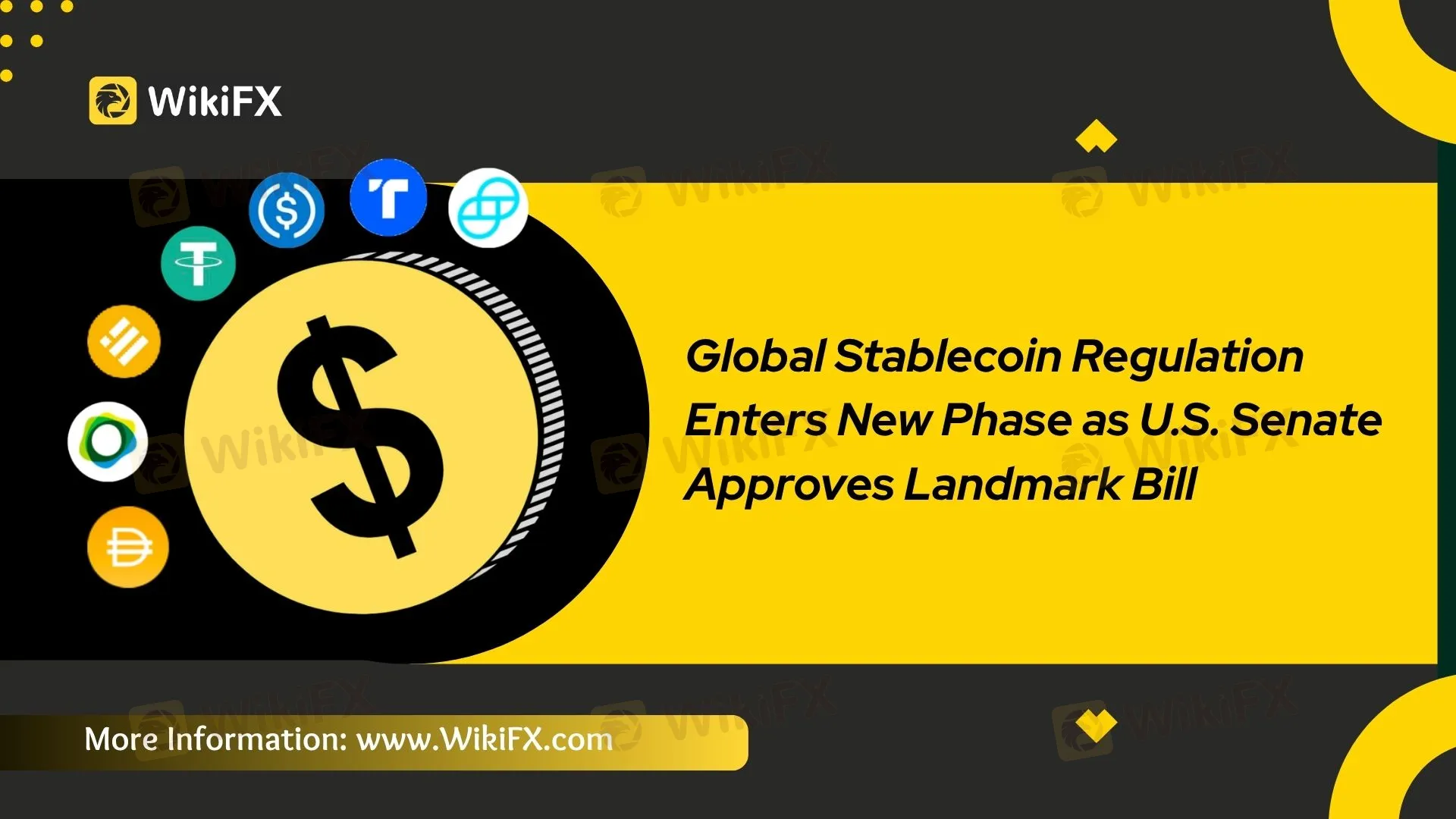Global Stablecoin Regulation Enters New Phase as U.S. Senate Approves Landmark Bill
Abstract:The U.S. Senate has passed the GENIUS Act, a historic move to regulate stablecoins pegged to the U.S. dollar. As the world’s major economies race to define legal frameworks for digital currencies, this vote marks a pivotal moment—one that echoes Europe’s MiCA rules and mirrors regulatory shifts in Asia.

U.S. Senate Greenlights Stablecoin Bill
In a significant step forward for crypto regulation, the U.S. Senate has approved a long-anticipated bill to govern stablecoins—digital tokens designed to maintain a 1:1 peg to fiat currencies like the U.S. dollar. Known as the GENIUS Act, the legislation passed with broad bipartisan support by a 68–30 margin, marking a rare moment of cross-party consensus in Washingtons polarized climate.
Stablecoins such as USDC and USDT have become vital components of the crypto economy, acting as on-chain cash equivalents used in trading, remittances, and increasingly, cross-border payments. Yet their rapid growth—combined with high-profile failures in the broader digital asset market—has raised concerns among regulators about transparency, financial stability, and illicit finance.
If signed into law, the bill will require stablecoin issuers to hold reserves in liquid assets, such as short-term U.S. Treasury securities, and disclose those holdings monthly. The bill would also prohibit unlicensed or foreign issuers from distributing dollar-backed tokens to U.S. users without oversight.
The Global Race to Regulate Stablecoins
The U.S. is not alone in its attempt to regulate stablecoins. Earlier this year, the European Union enacted MiCA, or the Markets in Crypto-Assets regulation, which includes robust provisions for asset-referenced tokens and e-money tokens—effectively EU-compliant stablecoins. Under MiCA, issuers must be licensed and meet transparency, reserve, and consumer protection requirements.
Frances financial regulators, in particular, have taken a firm stance, warning that without ESMA-level enforcement, the bloc may see regulatory arbitrage where countries undercut each other to attract crypto business.
In Asia, countries like Vietnam are also exploring centralized pilots for fiat-pegged tokens, while Hong Kong is preparing its own regime for stablecoin licensing. Meanwhile, Singapore and Japan already have frameworks in place requiring stablecoin issuers to be regulated financial institutions.
This global convergence signals that stablecoins are no longer fringe instruments—they are fast becoming a foundational pillar of future payment systems.
Concerns over Conflicts, Loopholes, and Political Motives
Despite its significance, the GENIUS Act is not without controversy. Critics argue that the bill may allow private companies—including tech giants—to issue their own stablecoins, potentially creating systemic risks or circumventing anti-money laundering rules.
Democratic Senator Elizabeth Warren sharply criticized the bill for its perceived loopholes, suggesting it may facilitate “financial instability, corruption, and reduced consumer protections.” She also questioned the bill‘s timing and its ties to former President Donald Trump’s crypto-linked ventures, including the promotion of a meme coin ($TRUMP) and the launch of a crypto firm co-owned by Trump family members.
The Conference of State Bank Supervisors (CSBS) also voiced concerns that the bill may weaken the authority of state regulators by expanding the role of federally unregulated institutions in issuing digital currencies.
Looking Ahead: A Global Benchmark for Digital Dollar Regulation?
The House of Representatives must now reconcile its version of the bill before it can be signed into law by President Trump, whose administration has publicly supported broader adoption of digital assets. Analysts say a final version could emerge as early as August.
If passed, the GENIUS Act would give the U.S. one of the most detailed federal-level regulatory frameworks for stablecoins to date—potentially influencing how other jurisdictions approach digital dollar regulation.
As stablecoins sit at the intersection of traditional finance, crypto innovation, and central bank policy, the evolving legal landscape in the U.S., EU, and beyond will shape how money moves in the digital age.
Read more

Philippines Sets Southeast Asia’s First Crypto Regulatory Framework
Philippines launches pioneering crypto regulations, enhancing investor protection and market transparency with strict rules for CASPs.

Tether Freezes $12.3 Million in USDT Over Money Laundering Concerns
Tether freezes $12.3 million in USDT on Tron blockchain, reinforcing its anti-money laundering efforts and compliance with U.S. Treasury sanctions.

Crypto News: $1 Trillion Managed Funds Fail Key Compliance Tests
ASIC finds $1 trillion in managed funds failing compliance, risking investor protection with weak oversight on design, dispute resolution, and reporting.

Robinhood Launches Free Desktop Trading Platform for UK Investors
Robinhood launches its free desktop trading platform, Robinhood Legend, in the UK, offering advanced features for active investors, including 6,000 US stocks with no commissions.
WikiFX Broker
Latest News
Tether Freezes $12.3 Million in USDT Over Money Laundering Concerns
MiCA Unlocks EU Crypto Market, but National Tensions Rise as Gemini and Coinbase Near Approval
Retirement Dreams Shattered: Don't Do This To Yourself!
Philippines Sets Southeast Asia’s First Crypto Regulatory Framework
EU Regulators Imposed Over €71M in Sanctions in 2024, ESMA Calls for Enforcement Convergence
FortuixAgent Review 2025: Is it Scam or Legit?
Danske Bank expects the European Central Bank to make its final interest rate cut in September.
No Regulation, Revoked Licence: Is Tradehall Safe to Use?
FXGT.com Trading Platform Review 2025
ATTENTION! Red Alert on These Brokers !
Rate Calc
